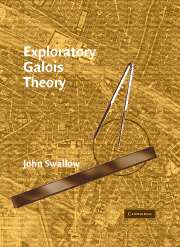Book contents
- Frontmatter
- Contents
- Preface
- Introduction
- 1 Preliminaries
- 2 Algebraic Numbers, Field Extensions, and Minimal Polynomials
- 3 Working with Algebraic Numbers, Field Extensions, and Minimal Polynomials
- 4 Multiply Generated Fields
- 5 The Galois Correspondence
- 6 Some Classical Topics
- Historical Note
- Appendix: Subgroups of Symmetric Groups
- Bibliography
- Index
6 - Some Classical Topics
Published online by Cambridge University Press: 06 July 2010
- Frontmatter
- Contents
- Preface
- Introduction
- 1 Preliminaries
- 2 Algebraic Numbers, Field Extensions, and Minimal Polynomials
- 3 Working with Algebraic Numbers, Field Extensions, and Minimal Polynomials
- 4 Multiply Generated Fields
- 5 The Galois Correspondence
- 6 Some Classical Topics
- Historical Note
- Appendix: Subgroups of Symmetric Groups
- Bibliography
- Index
Summary
Knowing the Galois correspondence for subfields of ℂ and some strategies for the determination of Galois groups of field extensions is, of course, just the beginning. It is of interest to determine the Galois groups of families of polynomials, to determine field extensions of a ℚ with a specified Galois group, to find generalizations of the Galois theory of subfields of ℂ to arbitrary fields, and to apply the tools of Galois theory to solve problems further a field. In this chapter, we give introductions to several of these topics.
Roots of Unity and Cyclotomic Extensions
Perhaps the most basic polynomials are those of the form Xn − 1. In this section, we study their roots, called roots of unity, and the field extensions they generate. We first define roots of unity and cyclotomic extensions.
Definition 30.1 (Root of Unity, Primitive Root of Unity). A root of unity ω is a root, in the complex numbers, of a polynomial of the form Xn − 1 for some n ∈ ℕ. We say that ω is a primitive root of unity of order n, or a primitive nth root, if ω is a root of Xn − 1, but not of Xm − 1 for any 1 ≤ m < n.
Note that the definition of a root of unity ω is equivalent to saying that ω is an element of finite order in the multiplicative group ℂ* of ℂ, and it will be useful to view roots of unity in this way. You may wish to recall some results on finite cyclic groups, particularly concerning which elements of a cyclic group are generators of that group.
- Type
- Chapter
- Information
- Exploratory Galois Theory , pp. 152 - 192Publisher: Cambridge University PressPrint publication year: 2004

